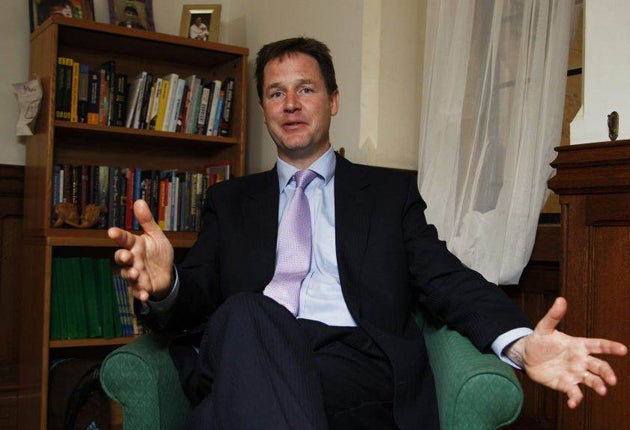Now the battle begins to win Clegg's heart
The Liberal Democrat leader's interview in yesterday's Independent has provoked a political storm. Andrew Grice reports

Your support helps us to tell the story
From reproductive rights to climate change to Big Tech, The Independent is on the ground when the story is developing. Whether it's investigating the financials of Elon Musk's pro-Trump PAC or producing our latest documentary, 'The A Word', which shines a light on the American women fighting for reproductive rights, we know how important it is to parse out the facts from the messaging.
At such a critical moment in US history, we need reporters on the ground. Your donation allows us to keep sending journalists to speak to both sides of the story.
The Independent is trusted by Americans across the entire political spectrum. And unlike many other quality news outlets, we choose not to lock Americans out of our reporting and analysis with paywalls. We believe quality journalism should be available to everyone, paid for by those who can afford it.
Your support makes all the difference.Labour will today warn 300,000 wavering voters who are tempted to support the Liberal Democrats that they could let David Cameron into Downing Street by the back door.
Labour strategists have identified this key group of swing voters in 28 Labour-Conservative marginal seats. They will be bombarded with personalised letters this weekend appealing to them to support the progressive cause by voting Labour to keep the Tories out. These voters are typically among the 1 million who defected from Labour in 2005 – often middle class, university-educated and disillusioned over the Iraq war or introduction of university tuition fees.
Like all political parties, Labour is trying to have it both ways. In its blitz in these seats, it will portray Nick Clegg as a right-leaning figure who supports "savage cuts" in public spending. Yet in other parts of Britain, where the main fight is between the Liberal Democrats and the Tories, Labour will avoid full-frontal attacks on the third party. "We need the LibDems to do well in the South-west," one Cabinet minister admitted yesterday.
The crossfire of the election battle has not stopped the speculation about whom the Liberal Democrats might jump into bed with in the event of a hung parliament. Mr Clegg revealed to The Independent yesterday that this weekend he would announce four "tests" for Labour and the Conservatives in order to help him decide which party he might want the Liberal Democrats to side with if neither won an overall majority at the general election.
Labour will go head-to-head with the Liberal Democrats in some northern seats, where Mr Clegg hopes to offset any losses to the Tories in the south by invading Labour's traditional turf. David Cameron, meanwhile, has been love-bombing Liberal Democrat supporters, stressing that he is a "liberal Conservative" who has changed his party into a genuinely progressive one.
Not to be outdone, Mr Clegg used the Conservative-supporting magazine The Spectator to tell its readers that he admires Margaret Thatcher. "Her victory over a vested interest, the trade unions, was immensely significant," he said.
In Labour circles, there is talk of rekindling the progressive anti-Tory alliance that Tony Blair and Paddy Ashdown spent many hours plotting before the 1997 election. Gordon Brown was never as keen as Mr Blair on the Lib-Lab project, but times have changed and Mr Brown might be feeling much warmer towards the Liberal Democrats on May 7 if they could help him to cling on to power.
In his interview with The Independent, Mr Clegg insisted no talks are going on now between his and the other two parties about what might happen. But there are bound to be some nods and winks going on in private.
There are some issues on which the Liberal Democrats and the Tories agree. Both have attacked Labour's stance on civil liberties and favour smaller government. Both would seek to scrap the national identity card scheme, the £12bn plan to computerise NHS patient records and scale back Mr Brown's flagship tax credits programme for middle income families and his child trust funds.
On the face of it, the Tories and Liberal Democrats agree on the need for a "pupil premium" to help children from disadvantaged backgrounds. However, the Tories have not yet said where the money would come from or matched Labour's pledge to raise the schools budget by more than inflation.
Although Mr Clegg is keen to keep his options open, his party probably has more in common with Labour than the Tories. Above all, on the election's central issue, the Liberal Democrats agree with Labour that immediate public spending cuts would risk a return to recession, while the Tories would start to cut this year. That could prove a stumbling block to a Lib-Con deal.
Clegg's demands : But what will the other parties do?
Tax shake-up
*Lib Dem demand: Raise tax thresholds to £10,000 to lift 4 million people out of tax; higher taxes and end to perks for the rich.
*Likely Tory response: No deal.
*Likely Labour response: No deal.
Green economy
*Lib Dem demand: Switch to green economy to create jobs and make UK less dependent on financial services.
*Likely Tory response: Deal possible. Finance will be smaller anyway after recession.
Likely Labour response: Deal possible. Also promoting "green jobs".
Education boost
*Lib Dem demand: "Pupil premium" plan to give schools £2,500 extra per pupil for the 1m most deprived children.
*Likely Tory response: Deal. Is part of their policy to allow parents and groups to open new schools.
*Likely Labour response: No deal.
Political reform
*Lib Dem demand: New voting system for Westminster elections; elected House of Lords.
*Likely Tory response: No deal.
*Likely Labour response: Deal possible. Favours elected Lords and alternative vote system.
Join our commenting forum
Join thought-provoking conversations, follow other Independent readers and see their replies
Comments